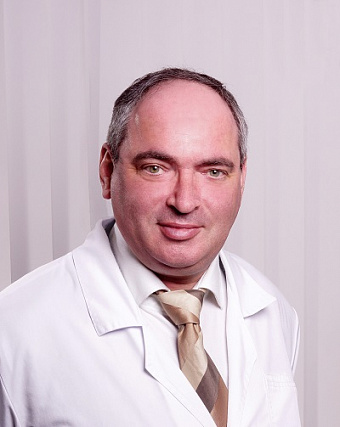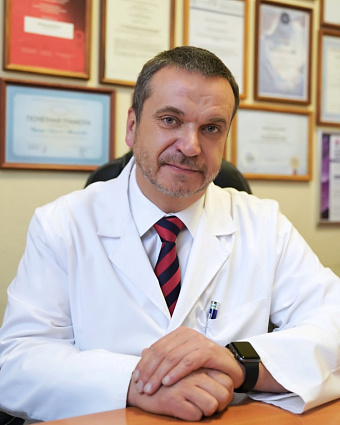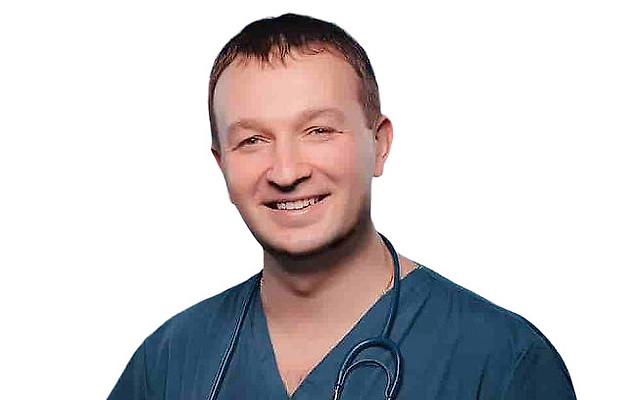Liver Cancer
Liver cancer is a malignant tumor that arises in liver cells. It can be primary (hepatocellular carcinoma) or secondary—when metastases from other organs penetrate the liver tissue. This is one of the most aggressive types of cancer, often asymptomatic in the early stages. Timely detection is critically important for effective treatment and prognosis.
Symptoms and Signs of Liver Cancer
The disease may remain asymptomatic for a long time. In later stages, the following symptoms may occur:
-
discomfort or pain in the right upper abdomen;
-
loss of appetite;
-
sudden weight loss;
-
jaundice;
-
general weakness, fatigue;
-
abdominal swelling due to fluid accumulation (ascites).
These symptoms require immediate medical attention and diagnostics.
Causes and Risk Factors of Liver Cancer
Among the main causes and risk factors are:
-
chronic viral hepatitis B and C;
-
liver cirrhosis of any etiology;
-
alcohol abuse;
-
fatty liver disease;
-
genetic predisposition;
-
exposure to aflatoxins;
-
diabetes and obesity.
Comprehensive screening and monitoring are especially important for people in high-risk groups.
Classification and Stages of Liver Cancer
Several tumor types are identified, the most common being hepatocellular carcinoma. The disease is classified into stages:
-
Stage I — localized tumor, no metastases;
-
Stage II — tumor invades vessels, possible single metastases;
-
Stage III — multiple tumor nodes, metastases in lymph nodes;
-
Stage IV — multiple distant metastases.
The stage determines the choice of therapy methods and prognosis.
Diagnosis of Liver Cancer
Diagnosis includes:
-
laboratory tests (liver function tests, alpha-fetoprotein level);
-
ultrasound examination;
-
CT and MRI;
-
PET-CT;
-
liver biopsy;
-
angiography.
Only a comprehensive approach can accurately determine the location and spread of the tumor.
Modern Methods of Treating Liver Cancer
Treatment of liver cancer requires an individually selected regimen. Both surgical methods and systemic therapy are used.
Surgical Treatment
In early stages, radical tumor removal is possible.
Liver Resection
Removal of the affected segment of the organ is one of the main approaches in limited disease and preserved liver function.
Liver Transplantation
Used when resection is not possible or in multiple tumors, if the patient meets the criteria.
Radiofrequency Ablation
A minimally invasive method where the tumor is destroyed by radio waves that heat the tissue to a high temperature.
Microwave Ablation
A similar approach using microwave radiation. Applied to small tumors.
Chemotherapy
More often used in advanced stages. Drugs that destroy tumor cells are administered intravenously. Can be used as systemic or regional therapy.
Targeted Therapy
A modern method targeting molecular markers inside the tumor. Used in inoperable and metastatic cases.
Immunotherapy
Stimulates the patient’s immune system to fight cancer cells. Effective in some patients at advanced stages.
Radiation Therapy
Prescribed when surgery is not possible or to relieve pain. Modern methods allow precise targeting of the tumor while sparing healthy tissues.
Transarterial Chemoembolization (TACE)
A chemotherapeutic agent with a vessel-blocking substance is delivered through a catheter into the liver artery. This enhances effect and reduces systemic exposure.
Transarterial Radioembolization (TARE)
A method similar to TACE, but radioactive microspheres are used instead of chemotherapy drugs.
Prognosis for Liver Cancer
Prognosis depends on the stage at diagnosis, comorbidities, and individual response to treatment. In early stages, long-term remission is possible after resection or transplantation. In later stages, the goal is to slow tumor growth and improve quality of life.
Prevention of Liver Cancer
Prevention includes:
-
vaccination against hepatitis B;
-
regular check-ups for chronic liver diseases;
-
avoiding alcohol and smoking;
-
weight and blood sugar control;
-
healthy diet and avoiding harmful substances.
Timely consultation and monitoring are key to reducing the risk of tumor development.
Rehabilitation After Liver Cancer Treatment
After treatment, restoring body functions, especially of the liver, is important. Rehabilitation includes:
-
a diet limiting fatty and fried foods;
-
supportive medications;
-
monitoring by an oncologist and hepatologist;
-
moderate physical activity;
-
psychological support.
The rehabilitation plan is tailored individually depending on the treatment volume and the patient’s condition.
Liver Cancer Treatment in Russia
Modern Russian clinics offer a full range of methods for diagnosis and treatment of liver cancer. Many centers follow international protocols and use advanced technologies.
Clinics
Among reputable medical institutions:
-
European Clinic;
-
N.N. Blokhin Center;
-
European Medical Center (EMC).
These clinics specialize in liver tumors and perform resections, transplantations, targeted therapy, and ablations.
Cost
Treatment costs vary depending on the stage, procedures, and clinic level:
-
consultation — from 100 USD;
-
diagnostics — from 700 USD;
-
tumor removal surgery — from 4000 USD;
-
chemotherapy — from 1000 USD per course;
-
targeted therapy — from 2000 USD;
-
transplantation — from 20000 USD.
Prices may vary. Many institutions offer "all-inclusive" packages for international patients.
MARUS Assistance
MARUS is a platform that helps international patients access qualified medical care in Russia. It allows clinic selection, consultations without waiting, transfer arrangement, and document support. The platform accompanies the patient at all stages—from first contact to rehabilitation. This simplifies treatment and makes it more accessible, especially when abroad.
Ophthalmology
Oncology
Plastic Surgery
Dentistry
Care Assistants
All information on this website is provided for informational purposes only and does not constitute medical advice. All medical procedures require prior consultation with a licensed physician. Treatment outcomes may vary depending on individual characteristics. We do not guarantee any specific results. Always consult a medical professional before making any healthcare decisions.

Doctors
Choose the package that suits you best — from selecting the right doctor and clinic to full trip and treatment organization
MARUS support options
Choose a package that works for you — from choosing your doctor to full-service travel and treatment
Send a request
You choose the clinic — we’ll take care of travel and treatment arrangements and all the paperwork.























